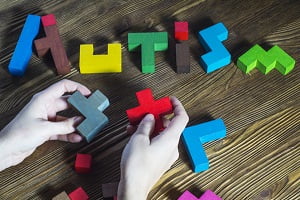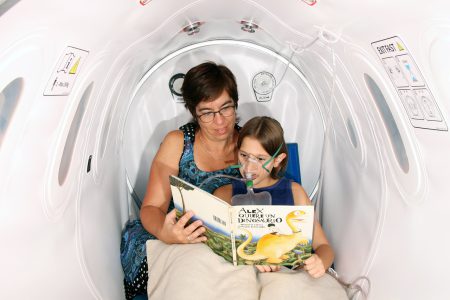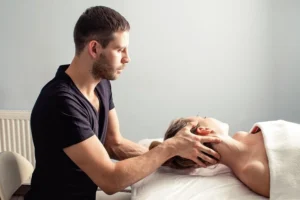Signs and Symptoms of Autism in Different Age Groups
- Updated on: Jul 12, 2024
- 5 min Read
- Published on Apr 23, 2021

Early Signs of Autism
Autism signs and symptoms are mostly noted in the initial 2-3 years of age in children and in some cases it is detected as early as within 18 months. It is likely that the signs of autism are detected at very early ages. But sometimes they go unnoticed till adolescence. Signs in early and late detection of autism are:
- 6-18 month- mostly babies with autism fixate on objects or do not respond to people
- Older babies and toddlers – may fail to respond to their names, avoid eye contact, lack joint attention, and engage in repetitive movements such as arm flapping
- Adolescents and adults – difficulties in socialization, atypical communication, and restricted mental flexibility. These signs can appear at any stage of adulthood, between 19-60 years of age.
Signs of Autism in Infants
Infants are new-born babies below the age of 6 months. The signs and symptoms of autism in infants rarely go unnoticed by parents and peers as infants either hardly show any unusual behavior or they are so immature that such minute signs may get unnoticed by parents. The signs and symptoms that infants can show if observed carefully may include-
- Not looking into mother’s or people’s eye.
- Not able to react to mother’s voice
- Infants with autism do not smile and respond to social cues from others
- Babies with autism do not respond to their names
- Infants may feed slowly or doesn’t suck well
- Infants don’t react to bright lights and loud sounds
- They are unable to grasp objects
- They usually ignore new faces and get upset by unfamiliar people
Here, one must keep in mind that as infants are very young in age, these signs may be shown by infants with no autism as well. So, consulting a doctor and proper diagnosis is necessary before coming to a conclusion about the infant suffering from autism.
Signs of Autism in Babies
At this developing stage, proper monitoring over the developmental process and noticing any abnormal behavior help in early detection of the symptoms of autism in babies. Babies younger than 12 months fall in this group. The abnormalities which are seen in babies during this developmental stage are:
- Babies are more affectionate with the closer ones
- Not able to reach for objects
- Babies are not able to sit on their own
- Autistic babies usually seem stiff and floppy
- They can’t hold their heads
- They don’t like being touched and cuddled
- Eye contact is avoided by these babies
- Autistic babies don’t smile and respond to their names, sound and light
- These babies show interest in playing with only one toy or one game
- They face difficulty in talking and don’t show early signs of talking or even not able to speak
- Gestures are not used by these babies like shaking heads for ‘no’ and reaching to parents when they want to hold them
- They aren’t able to crawl or drag on one side while crawling
- They are not able to stand even with a support
- They don’t utter any word or murmur anything
Signs of Autism in Toddlers
Toddlers are much grown up so the early signs of development (murmuring, nodding head, trying to jump, and follow nonverbal cues) are seen in them properly and any disabilities can be detected and observed easily as compared to infants and babies. The babies from age of 12-24 month are called as toddlers. Early signs and symptoms of autism in toddlers are:
- They are not able respond to their names by 12 months of age
- They don’t point to objects to show interest by 14 months
- Not able to speak even a single word by 16 months of age
- Do not play pretending games like feeding a doll by 18 months of age
- Walk on toes or doesn’t walk at all
- Do not respond in yes or no or through head nor wave hands for a actions like goodbye
- Lost social skills and seem to be lost in their own world
- Loss of verbal skills and not able to understand nonverbal cues
- Don’t understand words and actions
- Unable to follow simple instructions like go there and come here
- Loss of previously acquired skills
Signs of Autism in Children
Toddlers who are of 2 years and above in age are considered as children. At this stage, any of the minute or major signs may be seen and observed in children if they are suffering from autism. Most of the speaking skills and learning abilities are properly developed in children by this age. Early detection and diagnosis of the signs and symptoms of autism in children helps in controlling it. These signs and symptoms include:
- Do not interact with people outside their family
- Can’t throw or catch a ball
- Not able to climb stairs
- Unable to make eye contacts
- Not able to speak even one sentence clearly
- Unable to identify objects and relate to them
- Lost in their own world
- Follow same routine everyday
- Play with same toy or part of the toy
- React abruptly to loud sounds or bright light
- Repeat other’s actions and movements
- Repeat same words again and again
- Show interest in one topic or game
- Not able to walk properly till age of 3 years
- Robotic or rhythmic way of talking
- Feel depressed when separated from closed ones
Signs of Autism in Adults
Autism spectrum disorders signs are mostly observed till 3 years of age in children. But sometimes these signs are minute and may not be observed and noticed by close ones. It is necessary to observe these signs and symptoms of autism in adults to control them and avoid any progression. It may be possible that the early signs and symptoms, if get unnoticed, lead to severe autism and then the signs are clearly seen in adulthood. There may be chances that some people get affected with autism during their adulthood. Some adults are able to lead their normal lives and the degree of autism depends upon their intelligence and communication skills. It is observed that adults with High Functioning Autism (70% more IQ than autistic adults) lead a normal life independently, rest adults with autism need a lot of supervision, support and care as they are even not able to speak and communicate to people, do their daily routine work and get nonverbal cues and understand directions. The signs may include:
- Have attention deficit hyperactivity disorder (ADHD)
- 40-70% adults with autism have sleeping problems
- Extreme stimuli to something like sounds and lights or may have inefficient stimuli to these
- Few friends or no friend at all because of lack in socialisation and social skills
- Trouble in making relationship and maintaining it
- Trouble making eye contact, expressing themselves to people, express emotions etc
- Unable or trouble in understanding nonverbal languages like gestures and postures, facial expressions, emotions
- Not able to show empathy to others
- Difficulty in starting a small talk or maintaining a conversation
- Limited interest and unusual habits like talking about a topic of interest repeatedly
- Have obsession for routine and follow same routine everyday
- Extreme knowledge about some topics like stats, history etc.
- Unusual hobbies like collection of pebbles, coins, bottle caps etc.
- Repeat particular words and actions
- Robotic or rhythmic voice during speaking
- Having anxiety and depression problem
- Eat same food in breakfast daily, stick to same routine every day












